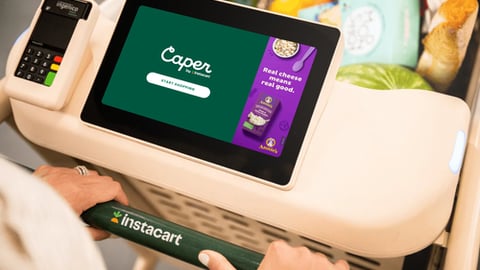Instacart Expands AI Use To Personalize Grocery Experience
Instacart is rolling out a new feature that utilizes generative AI and machine learning to create a more personalized experience for grocery shoppers.
The company’s new Smart Shop is designed to analyze customer habits and dietary preferences to surface the most relevant products faster. Additionally, the company also unveiled AI-powered Health Tags, which provide detailed and transparent nutritional information across the catalog, and Inspiration Pages, curated destinations within the Instacart experience featuring expert-backed health recommendations and shoppable recipes.
The first Inspiration Page was developed in collaboration with the American Diabetes Association (ADA) and features evidence-based nutrition guidance and diabetes-friendly grocery and recipe recommendations. Launched to coincide with National Nutrition Month, these offerings make it easier for consumers to discover relevant products based on their unique health and lifestyle preferences on Instacart.
"At Instacart, we want to turn the ordinary task of grocery shopping into a delightful, personalized shopping experience that takes the mental load out of finding the exact items that meet your preferences," said Daniel Danker, chief product officer at Instacart. "By combining our new Smart Shop technology, Health Tags, and Inspiration Pages, we're not just improving online grocery shopping – we're reimagining it, making it seamless to go from intention to action. By customizing your shopping journey to match your personal health goals or fit your dietary restrictions, we can unlock possibilities that weren't even on the table before."
Instacart's latest features enable consumers to shop according to their unique dietary and household preferences, simplifying the process of finding relevant products and making more informed grocery choices:
• Smart Shop technology: Powered by Instacart's catalog of 17 million unique items and its proprietary dataset of millions of grocery shopping journeys, Smart Shop leverages insights into nuanced consumer behaviors. Instacart's Smart Shop technology applies behavior analysis and affinity modeling to analyze real-world shopping habits, identifying patterns in user preferences with high precision. To further refine this understanding, large language models (LLMs) improve personalization by identifying the most valuable signals for predicting preferences to enhance accuracy.
As users shop, Smart Shop evolves its understanding in real-time, adjusting digital aisles to prioritize the most relevant products based on inferred preferences, while adapting to changing behaviors over time. When confidence in a preference is low, Smart Shop proactively engages users with clarifying questions like, "Show more low-carb options?"
• Customizable Smart Shop preferences: To further tailor the Smart Shop experience, customers can modify their shopping preferences, selecting from 14 unique dietary preferences, including gluten-free, high protein, high fiber, lactose-free, low calorie, low carb, low sodium, low sugar, low fat, organic, pescatarian, preservative-free, vegan and vegetarian. Through Smart Shop preferences, customers can explicitly share household details, such as whether they're also shopping for a baby, toddler, or pet. All of these inputs enhance Smart Shop personalization, helping surface items and aisles on Instacart that better align with each person's dietary and household preferences.
• New Health Tags: According to a recent Instacart customer survey, more than 70% of users have at least one dietary preference. To help them navigate grocery options, Instacart developed an AI-driven Health Tag system, which scans product data at scale to extract key nutrition characteristics. This multimodal AI platform leverages vision-language models (VLMs) to extract rich product attributes from text and images to enable rapid, high-accuracy tagging of nutrition claims, ingredients, and dietary labels. Using this model, Instacart has tagged more than 1.3 billion data points across food and beverage products in its catalog and today, Health Tags provides details on approximately half a million items across the more than 100,000 stores on the Instacart platform.
Instacart's 30 Health Tags now include gluten-free, grass-fed, heart-healthy, high fiber, high protein, keto, lactose-free, minimally processed, pasture-raised, preservative-free, no artificial colors, no artificial flavors, non-GMO, vegetarian, vegan, wild-caught and more, helping consumers easily view and filter items based on their preferences, discover new products and make more informed shopping decisions.
• Inspiration Pages: Instacart is also introducing Inspiration Pages, curated destinations within the Instacart experience that make expert nutrition advice and recommended recipes shoppable. The first page launched in collaboration with the ADA simplifies shopping for people living with prediabetes, diabetes, and obesity – while also supporting anyone looking to make healthier grocery choices.
"Instacart is making it easier for people to shop for nutritious foods that support their health goals and lifestyle,” said Sarah Mastrorocco, vice president and general manager of Instacart Health. “With Smart Shop technology and Health Tags, we're giving consumers the power to personalize their experience, with tools to filter and discover the best options for their unique preferences."
Instacart and ADA have also worked together to build a turnkey nutrition program for healthcare partners, using Instacart Health Fresh Funds customized by the ADA to cover foods informed by their Standards of Care in Diabetes. This new resource enables organizations like health plans and providers to adopt the Fresh Funds program and refer patients to the ADA Inspiration Page for reliable, actionable nutrition guidance, making it simpler to integrate nutritious food into chronic disease treatment and management at scale.




